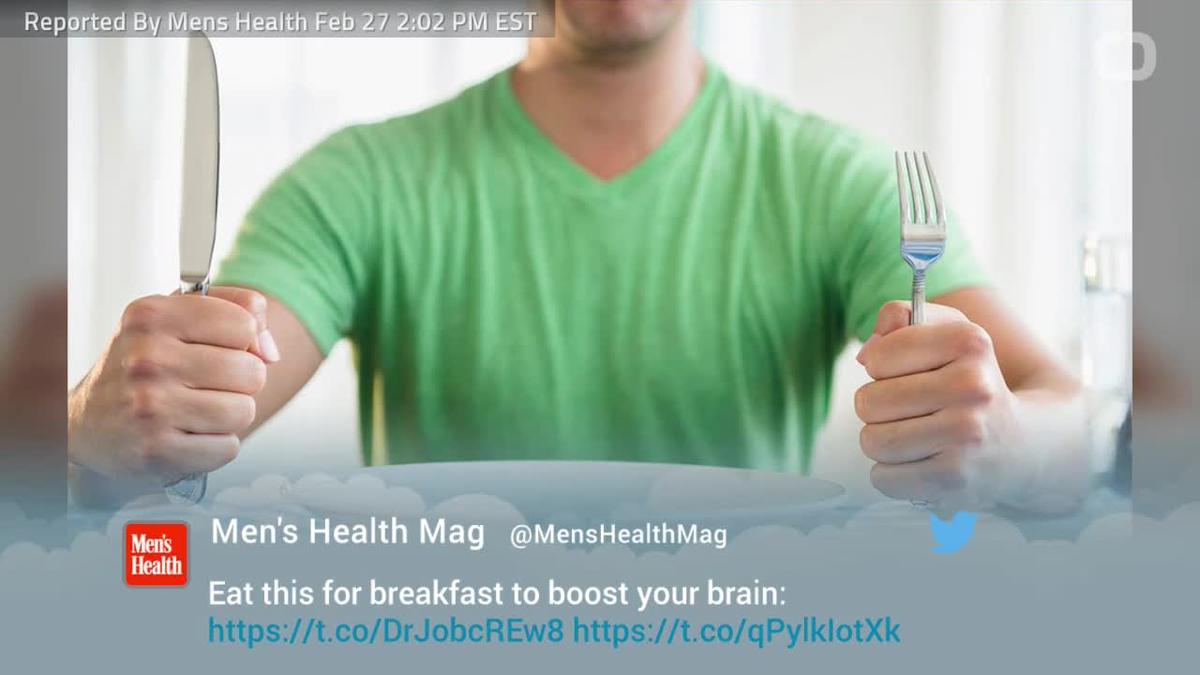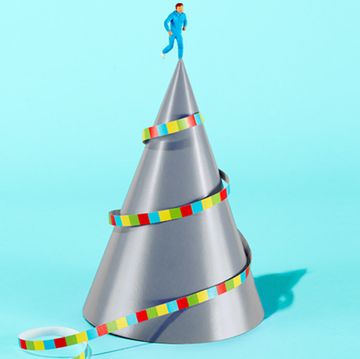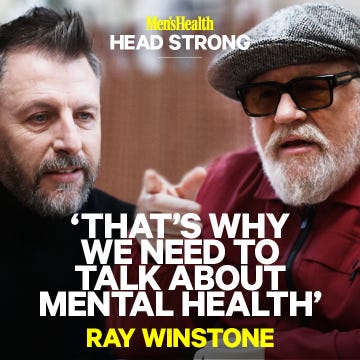Blue Monday. An annual event so well-recognised, it’s basically a Hallmark holiday, albeit a slightly ominous one.
Since British psychologist Dr Cliff Arnall came up with a mathematical formula that sought to explain the January blues back in 2005, the third Monday of the month has been affectionately dubbed “the most depressing day of the year”.
The calculation, which wouldn’t look out of place in a Year 9 maths class, factors weather, debt (specifically, the difference between debt and our ability to pay), time since Christmas, time since failing New Year's resolutions, lack of motivation in general, and lack of motivation about your motivation levels.
There’s no hard and fast research to prove its legitimacy – apparently, holiday companies use it to flog summer getaways – but we all accept it as gospel because it looks semi-official and sort of makes sense. Though Blue Monday may be a PR stunt, many experts agree there’s method behind the marketing.
Why Is Blue Monday the Most Depressing Day of the Year?
Monday already has a reputation as the most melancholy day of the week. According to The Office for National Statistics, 16 per cent of male suicides and 17 per cent of female suicides occur on a Monday, compared to 13 per cent on a weekend. Blue Monday comes loaded with post-Christmas pressures and the struggle, for many, of adopting a new habit or routine.
“Over the festive season, we’re encouraged strongly to get together with family and feel happy – irrespective of how we feel about them the rest of the year – mostly because we’re bombarded with adverts showing loving, blissful families,” says psychotherapist and hypnotherapist Nick Davies. “As with any forced emotion, this creates a reactionary response after about a month.”
At the same time, your brain is running your New Year’s resolutions through rigorous testing. When you decide to commit to dieting, exercising more, or working towards new goals, we force our brain to lay down new patterns of behaviour, Davies explains. “Science shows this happens roughly after a month of consistency, but our minds make it harder in the period between week three and four almost as if to say, ‘do you really want this?’.”
The ill-effects of one-too-many mince pies may now be a distant memory, but now many of us are facing up to the financial consequences – a debt hangover. Together, us Brits spend just under £446,000 every minute of every day in December on presents alone, according to The Independent. Factor in festive socialising as well as the all-important Christmas dinner, and it’s hardly a surprise your wallet feels light.
Then there’s the weather. Depression and lack of energy – symptoms of Seasonal Affective Disorder (SAD) – may present themselves in January, when little natural bright light is available.
The average office is just 500 lux (a measure of light intensity, as perceived by the human eye) according to light therapy specialists Lumie. This is a stark contrast to the 100,000 lux beaming down on a summer’s day, which comes with the added boost of serotonin-boosting vitamin D.
How to Tackle Blue Monday Head-on
January has certainly earned its reputation as the gloomiest month of the year, but there are steps you can take to beat the blues.
Trim Your Goals
December was all about mince pies and pints, but you’re a new man now. Marathon training is underway, evenings are dedicated to Veganuary meal prep, and you’re juggling 15 minutes of daily meditation with three new books. Guess what? You’re doing too much.
“Set yourself up for success by sticking to two changes which are important to you,” suggests life and behavioural coach Michelle Zelli. “Create a chart for the first 66 days, and strike through each day on your way. Visual confirmation of achievement helps build momentum and motivation to continue. When you focus on what you’re doing right, it’s hard to take a wrong turning.”
Diary Your Dosh
The average Christmas debt takes five months to pay off, says Tony Mills, director of Online Tax Rebates. The best way to tackle it? Keep a financial diary. “It might sound like a chore but keeping tabs on where your money goes is one of the best ways to wipe the slate clean and start the financial year off right,” says Mills.
“Keeping a log can help you see where you’re ‘leaking’ cash. You’d be surprised how much the extra coffee here or there can add up. Banking apps like Monzo or Moneybox can give you a clear picture of what you’re spending the most on, and give you the option to save or invest by rounding-up your purchases.”
Get Your Vitamin D Hit Elsewhere
In the winter months the sun’s rays aren’t strong enough for your body to make vitamin D, so you’ll stand to benefit from a dietary top-up, explains dietitian Juliette Kellow. Egg yolks, oily fish, and mushrooms are all sources.
“Oily fish like mackerel, trout and salmon are one of the few foods that are naturally rich in vitamin D, a nutrient that helps our immune system function properly,” she says. “Plus, oily fish are rich in an omega-3 fat called DHA that’s vital for keeping our brain functioning well.”
Identify the Root of Your Resolutions
Dip deep into the ‘why’ of your resolutions, and you’ll find the ‘how’ far easier. “New Year’s resolutions are no more likely to be sustained than 14th of January or 3rd of April resolutions,” says Dr Paul McLaren, medical director at Priory Hayes Grove
“If you really want to change your behaviour, then take time and effort to understand it. Weigh up your options and make a balance sheet of the pros and cons of changing or carrying on.”
Focus on the Process
Viewing your goal with tunnel vision prevents you from creating useful emotional feelings towards the process, advises Shabina Azmi, clinical fellow at Bupa UK.
“It’s well known that we are much more likely to keep up with something if we enjoy it,” she says. “If your goal involves giving something up, whether that’s smoking, drinking or unhealthy eating habits, try substituting it with a new healthy but rewarding behaviour.”
Bank on a Balancing Act
If you can’t afford to clear your debts in one payment, consider taking a balance transfer credit card out, suggests Jacqueline Dewey, managing director at credit report provider Noddle.
“You get a new card to pay off debt on old credit and store cards, often with a period of zero per cent interest,” she says. “Try and get the balance down to a manageable level as soon as possible, so you can keep in control of repayments.”
Use Noddle’s eligibility tool to see the cards you're likely to be accepted for before you apply. It only leaves a quotation search, so your credit rating won’t be affected.
Fight Fatigue with Food
Replace blood sugar-sapping chocolate and biscuits, and dodge the 3pm crash with a handful of almonds. Packed with fibre and protein, they’ll help keep you full until dinner.
“Almonds contain niacin, folate and iron, and are rich in riboflavin and magnesium, all essential nutrients that contribute to a reduction in tiredness and fatigue,” advises Kellow.
Who to Contact If You Feel Depressed
What if more than just Monday seems blue? It’s important to distinguish “reactive sadness” from clinical depression, says McLaren. “If you are in a depressive illness, then every day can feel bleak and dark and hopelessness.”
The symptoms of depression range from mild to severe, and may include tiredness, low self-esteem, difficulty concentrating, feeling anxious, feelings of helplessness, problems sleeping, finding it ‘hard to function’, low sex drive, loss of appetite, and physical aches and pains, among others.
If you’re unsure, the NHS has created an online assessment to help you determine whether you could be suffering from depression. If you think you may be depressed, seek help from your GP.
Sign up to the Men's Health newsletter and kickstart your home body plan. Make positive steps to become healthier and mentally strong with all the best fitness, muscle-building and nutrition advice delivered to your inbox.
For effective home workouts, uplifting stories, easy recipes and advice you can trust, subscribe to Men's Health UK today
















